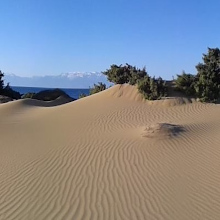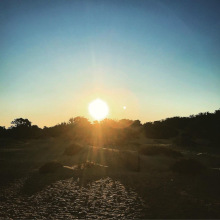Anthropause, this "big break" Share it on Facebook
 The term Anthropause, which also comes from the rich Greek language and literally means "human pause",
was included in Oxford Languages and its 2020 report Words of an Unprecedent Year. It was undoubtedly one of the new words of the year.
A word that came to stay.
The term Anthropause, which also comes from the rich Greek language and literally means "human pause",
was included in Oxford Languages and its 2020 report Words of an Unprecedent Year. It was undoubtedly one of the new words of the year.
A word that came to stay.
Anthropause, this "big break", confine hundreds of millions of people to their homes, intimidate them, suppress democratic rights and freedoms, restrict economic activity, negatively affect the overall health of people, lead people to suicide and ultimately limit the human life, although it has been very beneficial to Nature, to the quality of the environment, the reduction of pollution and overheating, and also for the survival of endangered wildlife.
A related scientific study, which took place during the period March-April 2020, on the effects of the first wave of lockdown on wildlife and published in June 2020 in the journal Nature, Ecology and Evolution, concluded that this, on a large scale, slowing down human activities has been extremely beneficial to endangered wildlife.
This has been observed not only by scientists and environmentalists but also by ordinary people, even uploading to social media a number of photos that showed the wildlife regaining some of its lost ground by occupying human spaces, which had previously been trampled by humans by wildlife. Photos of ibex roaming the streets and parks of Welsh cities, sheep in playgrounds, wild boars "partying" in Italian farms, herds of wild elephants on the streets of India and hungry monkeys, previously fed by tourists, to plunder in search of food in Indian cities.
 Wild puma were photographed in the center of the Chilean capital, Santiago, and jackals appeared in daylight in parks in Tel Aviv, Israel.
In the US jaguars and wildcats have reached the main city streets.
In Spain, wild boars reappeared in the fields.
Deer appeared on the streets of Trincomalee, Sri Lanka.
Elsewhere, geese roamed uninhabited areas, while other birds took advantage of the crashes and "occupied" airports.
The bears of Pindos were able to cross the Egnatia Odos, in order to find a match, without the risk of falling on passing cars.
Dolphins climbed, after decades, the Adriatic Sea and reached Venice and the unusually calm waters in the port of Trieste, Italy.
In Chrissi island of Crete, more herds of dolphins were observed even on the South side of the island, where they hadn't been observed for years.
Wild puma were photographed in the center of the Chilean capital, Santiago, and jackals appeared in daylight in parks in Tel Aviv, Israel.
In the US jaguars and wildcats have reached the main city streets.
In Spain, wild boars reappeared in the fields.
Deer appeared on the streets of Trincomalee, Sri Lanka.
Elsewhere, geese roamed uninhabited areas, while other birds took advantage of the crashes and "occupied" airports.
The bears of Pindos were able to cross the Egnatia Odos, in order to find a match, without the risk of falling on passing cars.
Dolphins climbed, after decades, the Adriatic Sea and reached Venice and the unusually calm waters in the port of Trieste, Italy.
In Chrissi island of Crete, more herds of dolphins were observed even on the South side of the island, where they hadn't been observed for years.
Animals and fish began to roam more freely on land and in the seas of the world, after the reduction of the traffic of the ships but also of the levels of noise pollution.
Another area in which Anthropause has been beneficial to the environment and therefore to human health has been that of air pollution. The lockdown, that imposed in March and April 2020 to curb the spread of Covid-19, reduced concentrations of major air pollutants in Europe by 70%.
Perhaps the most important lesson from the Covid-19 pandemic and the lockdown is that our survival goes through the sustainability of our natural environment, and the safeguarding of our democracy and human freedoms.




